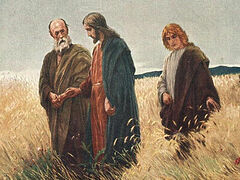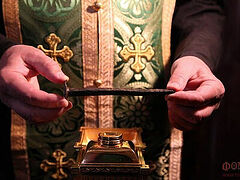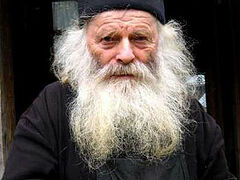A talk with Archpriest Andrey Gavrilenko, the Vice-Rector for Educational and Methodological Work at the Odessa Theological Seminary
—Father Andrei, you have recently been appointed Vice-Rector of one of the oldest and most respected seminaries. Apparently your first impressions have already been formed. What are students like today?
—Students of all times are united by certain factors: youth, lots of energy, weak will and lack of life experience. The students of the catechetical school of Origen and the Odessa Seminary are similar in this respect because of the universal human nature. Only tastes and attachments change. Perhaps our times differ from previous centuries only in the number of threads that link us to the world. Even ten years ago there was no Instagram or TikTok. There was not so much advertising and people did not reveal so many details about their personal lives. The soul of today’s student is literally surrounded by distractions: school friends, boys and girls, and all your past life in gadgets loom on the horizon all the time. You no longer need to go out into the city and no longer need to leave the monastery walls to go out into the world—the world is in your pocket and at any moment you can completely immerse yourself into it. Everyone advertises themselves and talks about 1000 little things. And this useless information creeps into your head and clogs up your memory. Here is the main difference: It has become harder for students to learn—their short-term memory is highly developed, but the habit of memorizing once and for all is not. Your head and heart are full of intellectual rubbish.
—Are the tasks of the Theological Seminary somehow changing in this regard?
—The former tasks of preparing good pastors of the Church remained. The seminary should give its students practical skills in parish ministry. It is supposed to open up the world of theology, Church history and worship to young people. But perhaps several new tasks of a spiritual and intellectual nature have been added. Sometimes you have to “reopen” the importance of simple Christian piety to students. I recently read in the seminary’s report for 1956 that “students are far from the spirit of Churchliness.” We are facing the same challenges. In addition to theology, we must give students what should have been inculcated at home in their families or at the parish by their father-confessors. I would like to outline for students the development of their personalities with a dotted line, to show the prospects for their spiritual and intellectual growth.
—You noted that the world is changing students. But it means that the same world is changing the future flock. Does the laity need theology today?
—We need to keep in mind the axiom of Blessed Augustine: Outside God, man will not find peace. Remember: “You have made us for Yourself, and our hearts are restless until they rest in You.” One of the definitions of man is “he who thirsts”: for power, money and pleasures, but also for peace, happiness and silence. According to the definition of St. Maximus the Confessor, man has “an ever-moving mind”: we are always in motion and always want peace.
This thirst can only be quenched by the Almighty Creator, Who gave us His qualities in His image.
Man needs a word about God, about holiness, about eternity. Man suffocates in a petty, fussy life. He is exhausted in pursuit of worldly things. And peace is in God alone. So, the human soul longs for a word about God, “theology”. It can even be said that man has a “thirst” for theology, because a feeling of fullness appears when the soul obtains knowledge about God. A priest I know once said that there is even a particular human feeling of joy, which appears when you listen to the Word of God. This, by the way, is confirmed by the Psalms.
—Will someone in a hurry, in a fuss, be able to comprehend sublime truths when there are ever more superficial things and fewer genuine and deep things in the world?
—The world is trying to change and “reshape” people, making them think and do everything in its (the world’s) own way. Superficial emotions, the pursuit of events, news feeds, etc. drain your spirit. Sin has taken the form of an illusion. And this is enough for the soul’s death: gambling, carnal sins and the passion for profit are now in your pocket gadgets. And yet man is much more complex than it seems at first glance. And God is so wise and strong that He can make an ascetic out of a skater, just as He once made St. Mary of Egypt out of Mary the harlot.
Meanwhile, there are conditions for turning to theology. St. Gregory of Nazianzus, who lived in the fourth century, noted that theology can be practiced by him who purifies his heart. This means that it is necessary to discover sublime truths, the teaching about the sacraments, etc., for those who at least open their ears—that is, find time and delve into the essence of “spiritual words”. The conscience must be awakened in such people.
I know from experience that people who are far from the Church are very likely to respond to preaching about good and evil, about the need to cleanse their conscience, and to be reconciled with their neighbors and God. Later the conscience, as God’s voice in a person, will itself become an inspiration on the path to God.
By the way, St. Gregory formulated the principle of theology: We should talk about God at the proper time and with the understanding of whom we are talking to, what and how much can be said.
The Savior in the Gospel says that the Word of the Kingdom must be kept in good and pure hearts. You need to withdraw yourself from vanity. Indeed, in order to “know God” you must “stop” (cf. Ps. 45:11). No matter how strange it may seem, but it is hardly possible to preach about the mystery of the Holy Trinity in the gym during a workout or during a conversation over coffee. Novels are written and inventions are made in silence. Feelings must be at rest in order to draw near to God, the Creator of all things. I think we must cultivate in ourselves a kind of intuition, a sense of the “measure of preaching”, so that “in time and respecting the limits” we can speak to others about the Mysteries of God in accordance with their spiritual age.
—What do modern people want to hear? What do they secretly want to hear from the Church? When the Church speaks about Christ, it is rarely heard. Why is there no power in our information that would regenerate the world?
—Theology is not the sum of knowledge, but that of life with God. This life needs to be learned. It is often learned through experience.
Modern people are not attracted by phrases from the nineteenth century. Their world has been spoiled by various advertising and flashy headlines. At this stage, we are faced with the task of saying the same things that our ancestors spoke about, but concisely, beautifully and brightly. Today people want good metaphors. And the writings of our saints are filled with them. A person will listen if we speak in a language he understands. We live in the age of technology. It would be nice to draw analogies with gadgets, their software and applications. Then our preaching comes alive. After all, the saints of the Golden Age spoke the language of the fourth century’s intellectuals, so they were understood and accepted. Christ Himself spoke in a language that was clear to people: There went out a sower to sow (Mk. 4:3); “a woman took leaven and hid in it three measures” (cf. Mt. 13:33); “A net was cast into the sea, and the good fish will be gathered into vessels, and the bad will be cast away” (cf. Mt. 13:47-48).
Theology cannot be separated from the preaching of the Kingdom of God. Its task is to call people to this Kingdom. We need to translate the Kingdom’s message into the language of the twenty-first century and pass it on with faith. But above all, we need to live by what we preach. I think all priests should come down from the ambo and recollect their lot as laymen: you are standing in church, listening to a sermon, getting ready for confession and Communion. Once you recollect that, you will understand what is necessary for the faithful standing in the nave. And then you can go up to the ambo and talk about what the heart longs for.
—Protopresbyter Alexander Schmemann said that he who embarks on theology should take an oath to treat words seriously, because the Church paid for every word with blood. Is this principle observed in the seminary?
—I love these reflections by Fr. Alexander. Indeed the Church paid with blood for every word of its dogmas. Take, for example, St. Athanasius of Alexandria and the word “consubstantial”, or St. Maximus the Confessor with his dyophysite theology.
Fr. Alexander Schmemann said that without theology there is and cannot be Christianity. Theology is the highest calling of man. And the higher the position, the more unforgivable the mistakes. Unfortunately, the world teaches people to treat words lightly. So, for example, jokes about faith, parodying words from church services, etc., are completely inappropriate. I will say one thing: This should be taught to students. Divine Words must be treated cautiously, as a dangerous weapon. The Apostle Paul said that the Word of God is… sharper than any twoedged sword (Heb. 4:12).
—You have noticed that very few sermons on theological subjects can be heard from the ambo. We can mostly hear Gospel stories and sometimes moral instructions. Why? Are there any objective reasons?
—I don’t think it’s the case everywhere. Of course, there should be more sermons on theological subjects. We have a lot of Baptisms in a row in the church where I serve, so I can give up to a dozen sermons a day. I dare to note that people on the fringes of the Church, and indeed church people themselves, give a lively response to the brief teaching of the Church. Our Creed is the best guide to Orthodox doctrine. Besides, it is the most comforting prayer. It contains such a concentration of God’s hope for man that it is simply impossible not to admire it. In general, the work of preaching, catechesis, the foundations of spiritual life are the strongholds of the modern education of future clergy—because the flock wants it.





